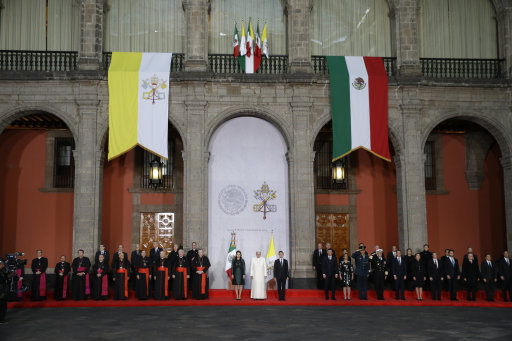Mexicans Expect Far More from the Pope Than We Will Ever Get
By Ariadna Estevez
The boldest thing anyone heard from the Pope on the topic was in Juarez City was when he criticized the greed of businesses that exploit their employees and condemned them to hell. But these words had little effect in a city like Juarez, where work labor exploitation has become alarmingly commonplace, including femicide, kidnapping, extortion, forced disappearances, executions, and forced displacement of the poor and marginalized—violations the maquiladora industry left in its path before gradually leaving the country. Mexico needs far more from the Pope than spiritual condemnation of its undesirable elements. Pope Francis defenders say that the fact that he chose these cities for his visit—Ecatepec, Morelia, San Cristobal de las Casas, and Juarez City—is in itself an acknowledgement of the serious human rights crisis that is taking place in Mexico. Yet in his sermons he did not explicitly condemn the human rights violations that characterize this crisis: forced disappearances, femicide, racism, social inequality and pedophilia. His most radical action in that sense was to criticize the corruption of the political class and its role in the spread of drug trafficking and violence. But at the same time, he allowed a lavish reception and a millionaire’s worth of spending of public resources for a security detail fit for the president of the United States. The central-south of Mexico City was militarized and deadlocked during his five-day visit—many residents felt that they were under siege and that the number of heavily armed officers (estimated at 60,000) on the streets was unreasonable and downright scary. This fact, criticized widely on social media—which his advisors must surely go through—didn’t appear to affect any his plans, giving the impression that the discomfort of many Mexicans over the massive display of force didn’t really bother him. At the end of his tour, Pope Francis wore out a politically uninspiring and philanthropic agenda with a visit to the domesticated poor, romanticize, folklore-esque indigenous peoples, and cancer patients. Today it is very clear that—despite accusations at the beginning of his tenure—Pope Francis was not one of the priests who collaborated with Argentina’s dictatorship, but it’s also evident that he was involved in some very questionable practices of the Catholic Church during that time. He was not one of those working in the chabolas or villas de miseria (shantytowns or slums), assisting the dispossessed in the organization for their rights. Yes: Pope Francis is a Jesuit. Yes, he lives with greater modesty than his predecessors. But he is not the kind of person who professes to the praxis of the preferential option for the poor, nor one who intervenes for their rights. His visit revealed a lot about his stance on human rights and how symbolic his influence really is. He didn’t meet with victims of human rights abuses, and he only met with the sick and the poor that the Mexican government wanted him to see. There were many things he could have done—but didn’t—in Mexico. In this regard, Pope Francis demonstrated exactly who he is. At least he was consistent.
|
.
Any original material on these pages is copyright © BishopAccountability.org 2004. Reproduce freely with attribution.
